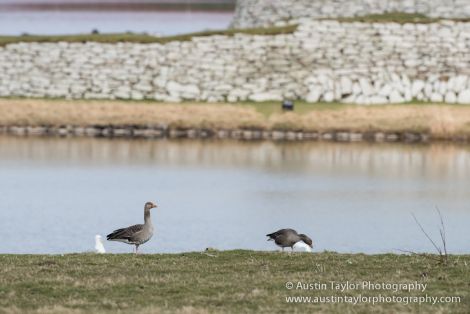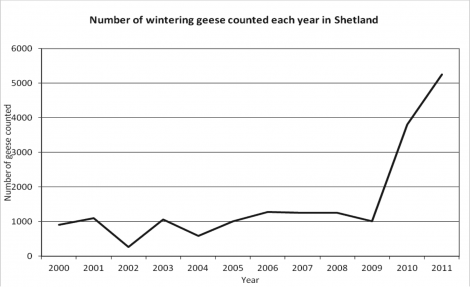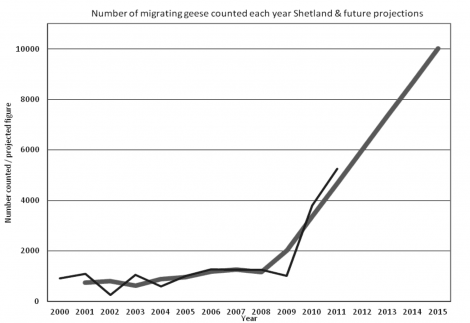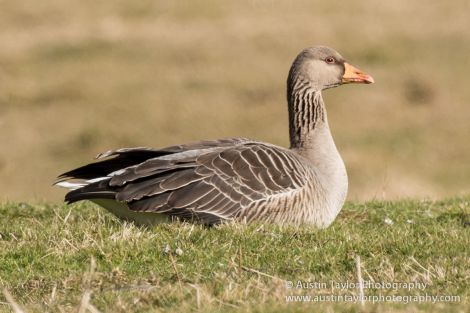News / Controlled goose cull is on the cards
A CALL for a controlled cull of greylag geese on Shetland has come from local crofters and farmers with backing from conservationist organisations.
After a meeting with isles MSP Tavish Scott this week, an application will be made to the Scottish government for a three year management plan starting in 2014.
The Shetland wild goose population has expanded dramatically in the past few years, stopping commercial growers from planting turnips and other crops.
After the cold start to this year hampering growth, livestock owners are worried about geese competing for early grass with sheep and cattle during the lambing and calving season.
A combination of climate change and subsidised agriculture has seen the greylag goose population soar over the past 30 years at an ever increasing rate
The warmer climate has brought growing numbers of Icelandic geese that traditionally overwintered on mainland Scotland to the northern isles, particularly Orkney.
Icelandic geese then began to colonise Shetland. The first pair was recorded on Unst in 1985, but by 2011 an estimated 1,000 pairs were breeding in the isles.
The post breeding population that year was thought to be 5,250 individuals, rising to 7,600 with winter migrants from Iceland. At current rates the 2015 population has been forecast as 10,000 birds.
Part of the attraction has been the huge increase in reseeding thanks to government grants, which more than doubled the amount of hill grassland from 7,338 to 18,618 hectares until 1994 when subsidies stopped.
A recent Shetland Bird Club report said the new apportionments in relatively undisturbed areas of hill land created a “perfect habitat” for geese, with heather moorland for nesting, improved grassland for grazing and freshwater lochs for safety.
“In effect the landscape could not have been managed in a more effective way to encourage Greylag Geese to breed in Shetland,” the report said.
Become a supporter of Shetland News
Complaints started to mount as the goose population grew and in 2011 there were four licences issued to shoot them during the closed season, with two applications being turned down. Only two were granted last year.
Meanwhile legal shooting during the open season between September and January increased, with 500 shot annually in the south mainland where numbers are greatest.
Shetland is high on the list of agricultural areas where geese are causing a problem, but the population is dwarfed by Orkney where more than 80,000 greylags were recorded in 2010.
Last year Orkney was authorised to introduce an “adaptive management plan” to shoot 5,500 geese during September, using experienced shooters overseen by staff from the Scottish Agricultural College.
Similar pilots have also been introduced in Coll and Tiree, and in Islay and the Uists.
Scottish Natural Heritage operations officer Juan Brown said the new application for a three year scheme in Shetland would be presented to the national goose management review group for introduction next year.
He also invited landowners to apply to SNH for a licence to shoot geese during the closed season, though stressed that there would be a bag limit on how many birds could be shot.
“We certainly understand that the agricultural community do feel that the geese are impacting on their businesses,” he said.
Last year Shetland Islands Council commissioned a report on the conflict between farmers and geese.
A questionnaire sent out to crofters and farmers throughout the isles received 14 responses, with 92 per cent saying they were adversely affected by geese.
Damage worth a total of £109,770 per year to crops of barley, oats, rape, cabbage, carrots, potatoes and turnips was recorded at 22 farms. Turnips accounted for half of the damage, with some holdings losing their entire crop.
One respondent said that growers were now only able to supply local shops and supermarkets with potatoes because of the birds’ impact.
Others have reduced their livestock due to the competition, and complained of having to buy in more silage to compensate.
The SIC report said growers felt “overwhelmed” by geese and had to change their cropping plans accordingly.
“Those who have grown commercial crops in the past have now given up due to crop decimation by geese in the winter and spring months. This is having a direct effect on the availability of locally grown produce in Shetland,” it said.
“The current control methods being used on the farms are proving to be ineffective.
“The respondents felt that the best way forward is to extend the current open season on goose shooting, introduce egg oiling, remove legal restrictions on the sale of wild goose meat and to encourage commercial and private shooting.”
South mainland farmer and local councillor Allison Duncan, who organised this week’s meeting with Tavish Scott, said: “This is a serious problem that has been growing over the years because they are settling the length and breadth of the islands.
“They are eating all the early grass which we need for lamb at foot and cattle with calves. The time is now for action, not words.”
Become a supporter of Shetland News
Shetland News is asking its many readers to consider start paying for their dose of the latest local news delivered straight to their PC, tablet or mobile phone.
Journalism comes at a price and because that price is not being paid in today’s rapidly changing media world, most publishers - national and local - struggle financially despite very healthy audience figures.
Most online publishers have started charging for access to their websites, others have chosen a different route. Shetland News currently has over 600 supporters who are all making small voluntary financial contributions. All funds go towards covering our cost and improving the service further.
Your contribution will ensure Shetland News can: -
- Bring you the headlines as they happen;
- Stay editorially independent;
- Give a voice to the community;
- Grow site traffic further;
- Research and publish more in-depth news, including more Shetland Lives features.
If you appreciate what we do and feel strongly about impartial local journalism, then please become a supporter of Shetland News by either making a single payment or monthly subscription.
Support us from as little as £3 per month – it only takes a minute to sign up. Thank you.






















































